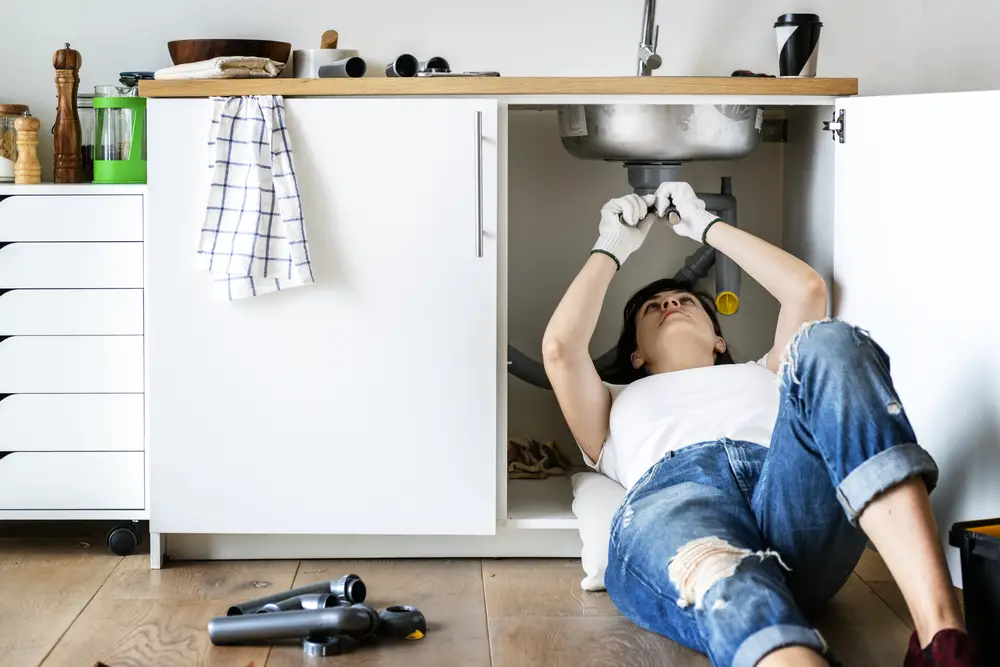
A kitchen is the heart of a home, and nothing disrupts its rhythm quite like a slow draining kitchen sink, often accompanied by the unpleasantness of smelly drains. Right? The annoyance of watching water sluggishly disappear down the drain, sometimes leaving behind an unwelcome odor, can turn a simple task into a time-consuming ordeal.
In this blog, we delve into the common causes of a slow-draining kitchen sink as well as explore effective solutions to restore the swift flow we all desire.
Understanding the Causes
Accumulation of Grease and Fat
One frequent offender behind a slow-draining kitchen sink is the accumulation of grease and fat. Over time, these substances can congeal and cling to the inner walls of pipes, creating a sticky barrier that impedes water flow. Regularly disposing of cooking oil in the sink can contribute to this problem, leading to gradual obstruction.
Food Residue Buildup
Another potential cause for the slowdown is the accumulation of food residue. Despite our best efforts with a garbage disposal unit, small particles of food can accumulate within the pipes, creating a narrowing effect that restricts water flow. This is especially true for starchy or fibrous foods that tend to clump together.
Mineral Deposits and Soap Scum
Mineral deposits and soap scum can create stubborn clogs within the pipes. Hard water, which contains abundant levels of minerals like calcium and magnesium, is particularly prone to causing these deposits. The gradual buildup can alleviate the diameter of the pipes, resulting in a slow drain.
Incorrect Slope of Pipes
Sometimes, the issue lies within the design of the plumbing. If the pipes lack the proper slope, water may not flow efficiently, leading to sluggish drainage. The incorrect slope may be a result of poor installation or gradual shifting of the pipes over time.
Diagnosing the Issue: Is It a Clog or Something Else?
Signs of a Clog
While a slow-draining kitchen sink may immediately bring to mind a clog, it’s crucial to distinguish between a clog and other potential issues. Signs of a clog include water pooling in the sink, gurgling noises from the drain, and an unpleasant odor emanating from the pipes. Identifying these signs can help pinpoint the root cause of the slow drainage.
Kitchen Sink Drains Slow But Not Clogged
In some cases, the kitchen sink may be draining slowly but not be fully clogged. This can be perplexing, as the gradual decrease in water flow may not be accompanied by the typical signs of a complete blockage. Understanding why a sink drains slowly without a visible clog is crucial to implementing the right solutions.
DIY Solutions: Tackling the Slow Drain Head-On
Baking Soda And Vinegar Treatment
For cases where slow drainage is caused by grease and fat buildup, a simple DIY solution involves vinegar and baking soda. Start by pouring hot water down the drain to help loosen the greasy residue. Then take one cup of baking soda and one cup of vinegar, mix them well. Pour this mixture into the clogged drain, letting it sit for 15-20 minutes. After that, flush the drain with hot water to clear away the softened debris. This is the easiest and most cost-effective way to get rid of a sluggish drain.
Plunging Away the Obstruction
For cases where the slow drain is indicative of a partial clog, a plunger can be a valuable tool. Ensure there is enough water in the sink to cover the plunger, creating a tight seal. Plunge vigorously for several minutes, and then check to see if the water drains more efficiently. This method is particularly effective for dislodging minor clogs and improving overall drainage. A plunger is a simple tool with a rubber cup in front and a wood or plastic handle in the back. It is easily available online or in grocery shops.
Seeking Professional Assistance: When DIY Isn’t Enough
Professional Drain Cleaning Services
When DIY methods fail to address the slow-draining kitchen sink issue, seeking professional help is the next logical step. Our professional drain cleaning services in Bedford utilize specialized equipment to clean the pipes and remove stubborn obstructions thoroughly. This approach ensures a comprehensive solution, addressing both the symptoms as well as underlying causes of the slow drainage.
Pipe Inspection and Repair
In cases where the slow drainage is attributed to incorrect pipe slope or structural issues, a professional plumber can conduct a thorough inspection. If necessary, they can make adjustments to the pipe slope or undertake repairs to ensure optimal water flow. This proactive approach not only resolves the immediate issue but also prevents future drainage problems.
Prevention Strategies: Maintaining a Swift-Flowing Sink
Dispose of Grease Properly
To avoid the accumulation of grease and fat, adopt the habit of disposing of cooking oil in a designated container instead of the sink. Once cooled and solidified, these can be safely discarded in the trash, reducing the risk of pipe obstruction.
Use a Sink Strainer
A simple yet effective preventative measure is the use of a sink strainer. This device captures food particles before they enter the drain, minimizing the risk of residue buildup. Regularly cleaning the strainer ensures its continued effectiveness.
Regular Maintenance Routine
Incorporate regular maintenance into your kitchen cleaning routine. Periodically use DIY solutions like baking soda and vinegar or boiling water to prevent the gradual accumulation of debris within the pipes. This proactive approach can significantly extend the life of your plumbing system.
Conclusion: Swift Solutions for a Swift Sink
In conclusion, a slow-draining kitchen sink can be a persistent nuisance, but with the proper knowledge and proactive measures, it’s a challenge that can be overcome. By understanding the various causes, diagnosing the issue correctly, and implementing appropriate solutions, you can restore the swift flow to your kitchen sink.
Whether opting for DIY methods or seeking professional assistance, taking action promptly ensures that the heart of your home continues to beat with efficiency and ease. A little maintenance goes a long way in preventing the sluggish woes of a slow-draining kitchen sink.For comprehensive solutions and expert assistance with persistent slow-draining kitchen sinks, turn to On Point Plumbing DFW in Bedford, TX. Our skilled professionals are equipped to diagnose and resolve plumbing issues efficiently. Don’t let slow drainage disrupt your kitchen’s flow; contact us today for prompt and reliable service.
